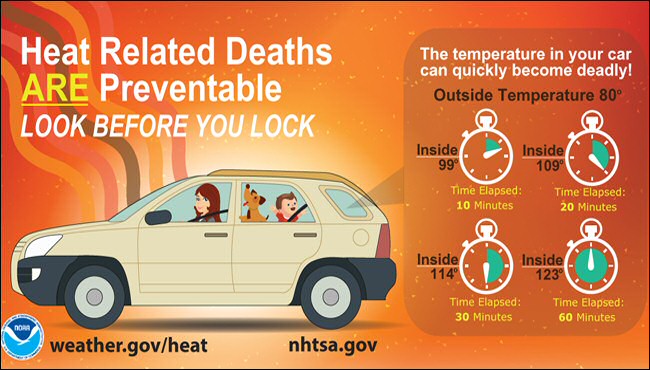 |
| For Your Information |
| If there is something that may be of interest to you, we will try to make that information available. |
|
|
 |
Don't Leave Children or Pets in Hot Cars |
 |
| |
|
It might be a run to the store for groceries or a trip to the mall to buy clothes. If there are small children or pets along for the ride, you might consider leaving them in the car until the shopping is done. It won't take long. A quick check of the car thermometer indicates an outdoor temperature of 80 degrees. That shouldn't be a problem, right? Think again.
|
|
|
| In the picture: Temperature rises (in degrees F) in an enclosed vehicle every ten minutes up to an hour. The data is courtesy of Golden Gate Weather Services. |
|
|
Your vehicle acts very much like a greenhouse sitting out in the sun. Energy from the sun goes through the windows and quickly heats the dashboard and seats, which in turn warm the surrounding air. Even on an 80 degree day, temperatures in the car can rise as much as 30 to 35 degrees in a half hour. Readings could be over 100 degrees in as little as 10 to 15 minutes.
Small children can easily suffer from heatstroke when faced with these conditions. Their body temperatures warm three to five times as fast as an adult. Pets are also in big trouble considering many have a thick coat of fur. While cracking the windows might increase air flow a bit, studies have shown this provides little relief.
|
|
|
| In the picture: Hyperthermia fatalities (children in vehicles) across the country from 1998 to 2023. The data is courtesy of Golden Gate Weather Services. |
|
|
Across the United States, an average of 37 children died each year of vehicular hyperthermia (since 1998). States with the highest per capita deaths were Louisiana, Mississippi, Oklahoma, Alabama, Arkansas, and Arizona (in that order). Per capita deaths in these states were at least double the national average. Two thirds of the fatalities happened during the summer months (June through August). Three quarters of these children were two years old or less. At least half of the children were left and then forgotten. Countless pets also succumb to the heat annually.
|
 |
| In the picture: To prevent heat deaths, remember to look before you lock. |
|
| |
|
Many of these deaths are preventable. To help increase awareness, the National Weather Service is using the slogan "Look Before You Lock" to remind people to never leave children or pets unattended in a vehicle.
If you see a child unattended in a hot vehicle, call 911 immediately! In the case of a pet, consider making the same call, especially if there are signs of heat stress (heavy panting, vomiting, a deep red or purple tongue, etc).
|
|
|